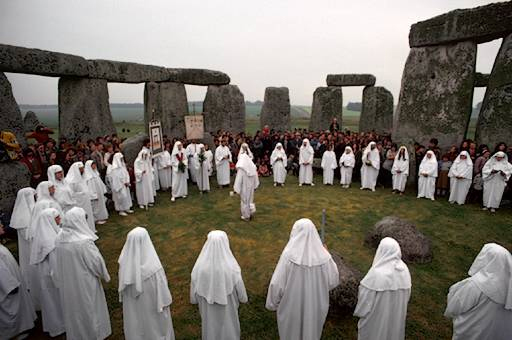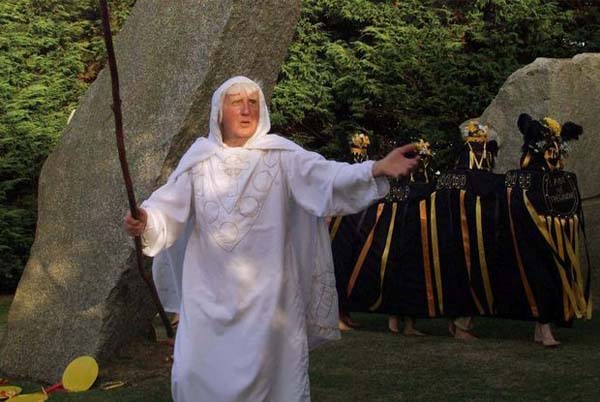October 2010
By Martin Beckford
Druidry has been recognised as an official religion in Britain for the first time, thousands of years after its adherents first worshipped in the country

The Druid Network has been given charitable status by the Charity Commission for England and Wales, the quango that decides what counts as a genuine faith as well as regulating fundraising bodies.
It guarantees the modern group, set up in 2003, valuable tax breaks but also grants the ancient religion equal status to more mainstream denominations. This could mean that Druids, the priestly caste in Celtic societies across Europe, are categorised separately in official surveys of religious believers.
Supporters say the Charity Commission’s move could also pave the way for other minority faiths to gain charitable status.
Phil Ryder, Chair of Trustees for The Druid Network, said it had taken four years for the group to be recognised by the regulator. “It was a long and at times frustrating process, exacerbated by the fact that the Charity Commissioners had no understanding of our beliefs and practices, and examined us on every aspect of them. Their final decision document runs to 21 pages, showing the extent to which we were questioned in order to finally get the recognition we have long argued for,” he said.
Emma Restall Orr, founder of The Druid Network, added: “The Charity Commission now has a much greater understanding of Pagan, animist, and polytheist religions, so other groups from these minority religions – provided they meet the financial and public benefit criteria for registration as charities - should find registering a much shorter process than the pioneering one we have been through.”
In its assessment of the Druid Network’s application, the Charity Commission accepts that Druids worship nature, in particular the sun and the earth but also believe in the spirits of places such as mountains and rivers as well as “divine guides” such as Brighid and Bran.
The document lists the “commonality of practice” in Druidry, including its eight major festivals each year; rituals at different phases of the moon; rites of passage and gatherings of bards on sacred hills, known as “gorsedd”.
It guarantees the modern group, set up in 2003, valuable tax breaks but also grants the ancient religion equal status to more mainstream denominations. This could mean that Druids, the priestly caste in Celtic societies across Europe, are categorised separately in official surveys of religious believers.
Supporters say the Charity Commission’s move could also pave the way for other minority faiths to gain charitable status.
Phil Ryder, Chair of Trustees for The Druid Network, said it had taken four years for the group to be recognised by the regulator. “It was a long and at times frustrating process, exacerbated by the fact that the Charity Commissioners had no understanding of our beliefs and practices, and examined us on every aspect of them. Their final decision document runs to 21 pages, showing the extent to which we were questioned in order to finally get the recognition we have long argued for,” he said.
Emma Restall Orr, founder of The Druid Network, added: “The Charity Commission now has a much greater understanding of Pagan, animist, and polytheist religions, so other groups from these minority religions – provided they meet the financial and public benefit criteria for registration as charities - should find registering a much shorter process than the pioneering one we have been through.”
In its assessment of the Druid Network’s application, the Charity Commission accepts that Druids worship nature, in particular the sun and the earth but also believe in the spirits of places such as mountains and rivers as well as “divine guides” such as Brighid and Bran.
The document lists the “commonality of practice” in Druidry, including its eight major festivals each year; rituals at different phases of the moon; rites of passage and gatherings of bards on sacred hills, known as “gorsedd”.
All charities must now demonstrate their benefit to the public, and Druidry was said to qualify since its followers are keen to conserve Britain’s heritage as well as preserve the natural environment.
The document even addresses the claims made by the Romans about Druids committing human sacrifice, but finds “no evidence of any significant detriment or harm” arising from modern beliefs.

It notes that although there are only 350 members of the Druid Network, a BBC report in 2003 claimed as many as 10,000 people followed the ancient faith across the country.
Membership of the Network costs £10 a year but ritual ceremonies such as that marking the summer solstice at Stonehenge are open to all.
Article from: telegraph.co.uk
Related
Source: http://www.redicecreations.com
Sem comentários:
Enviar um comentário